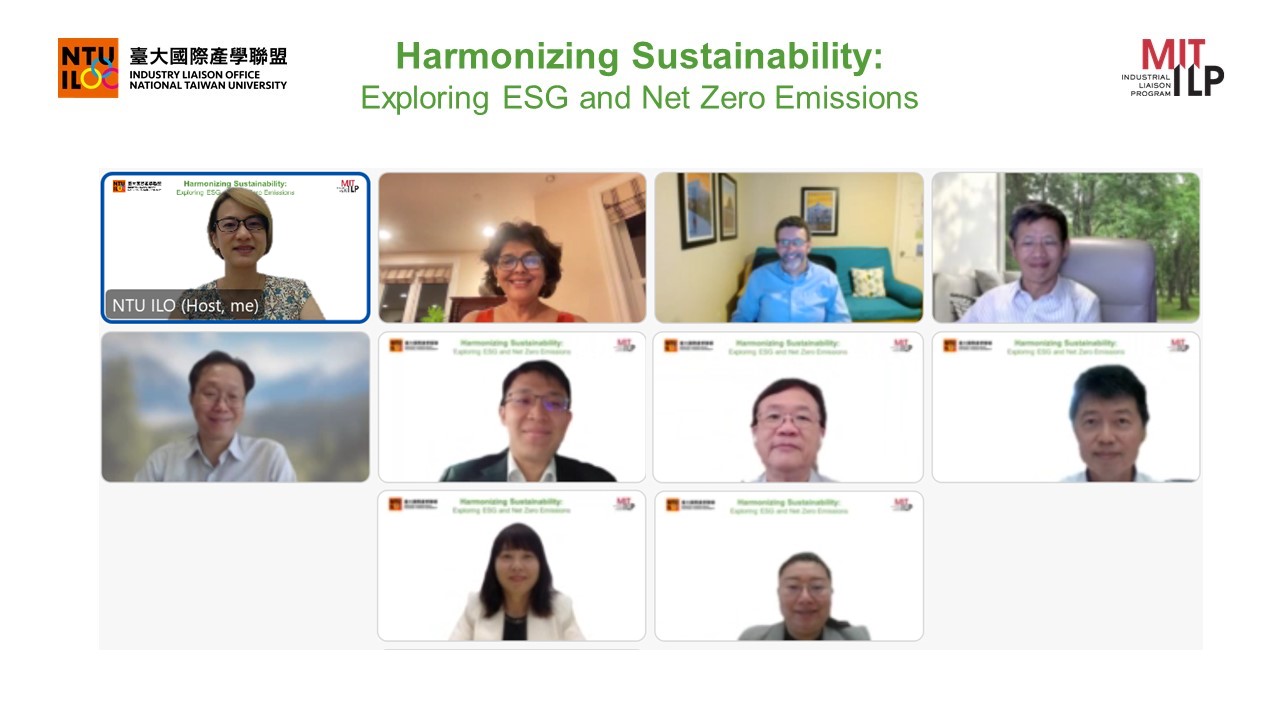In recent years, the threats and impacts of climate change have become increasingly severe, prompting many countries to list sustainable development as a key policy in response to the “Net Zero Emissions by 2050” target. National Taiwan University and the Massachusetts Institute of Technology held a webinar on September 20th with the subject “Harmonizing Sustainability: Exploring ESG and Net Zero Emissions”. Experts from both universities were invited to share their experiences and research from various fields. Professor Chung-Chih Wu, Director of the Industry Liaison Office and VP of the Office of Research and Development at NTU, stated in his welcome address, “The topic of sustainable development concerns everyone. However, the challenges in the pursuit of sustainability are intricate and vary across domains. It requires collaborative efforts, which involve governments, corporations, industries, and individuals like all of us, to make changes.”

Photo 1: Group photo of workshop speakers and guests
The webinar explored the challenges and solutions from various perspectives, including finance, industry-academia collaboration, and technological development. Dr. Gita R. Rao, Senior Lecturer in Finance at MIT, first shared her extensive experience in ESG and impact investing. As the landscape of ESG continues to evolve, companies and investors face increasing challenges in addressing climate change, workplace trends, regulations, and more. Dr. Rao specifically discussed the demand for water resources and renewable energy in certain Taiwanese industries and highlighted the opportunities for overcoming these challenges. Dr. Jeremy Gregory, the Executive Director of the MIT Climate and Sustainability Consortium, then shared MIT's successful experience in integrating academic innovation with industry practices to form strategic partnerships and advance sustainable development, mitigate climate change, and formulate effective solutions.
In the second half of the webinar, two professors from NTU presented their research on sustainable technology. With the growing demand for high-energy-density lithium-ion batteries in recent years, safety has become a paramount concern. Professor Nae-Lih Wu from the Department of Chemical Engineering at NTU introduced his research on a surface-modifying coating approach, proposing a technology that combines high performance with safety for lithium-ion batteries. Additionally, Associate Professor Shu-Yuan Pan from the Department of Bioenvironmental Systems Engineering at NTU shared his research findings on the cascade separation processes for fit-for-purpose wastewater reclamation. He illustrated the applications of these processes using examples such as piggery wastewater, brackish process wastewater, and industrial effluent.
The event moderator Professor Hwong-Wen Ma from the Graduate Institute of Environment Engineering at NTU made the following conclusion at the end of the event, “Now is a critical time for industry transformation. ESG and achieving net zero emissions are races against time. We need to make structural changes. Speakers from NTU shared innovations in energy storage and resource recycling technology, while MIT speakers shared their experiences in infusing capital resources into sustainable development. The presentations from these four speakers demonstrated diverse perspectives and practices in technology, systems, and management. The path to sustainable development is filled with challenges, and it is only through the cooperation of capital, technology, talent, and knowledge, as well as interdisciplinary partnerships, that we can find solutions.” The event showed the challenges and potential of achieving sustainability across various fields and opened up numerous opportunities for collaboration through communications among industry, academia, and research institutions.